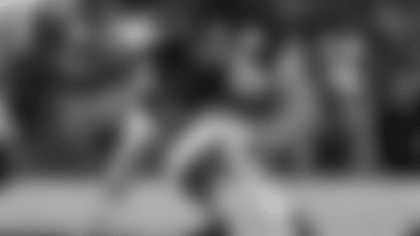Opening Statement...
Hello, everybody. I appreciate everyone's patience. We have a couple of announcements here and then I'll be happy to take some questions. We have re-signed Bobby Hamilton and Kenyon Coleman, and I guess if there are any questions I can take them from there … We did finish up the Thomas Jones trade this afternoon, so we did trade our first second-round pick, so 37th pick, to Chicago for Thomas Jones and to -- and their 63rd pick. With that I'd like to say that I really appreciate Chicago's professionalism, and we've worked hard to get it done. I think it's hopefully a good trade for everybody involved, and I want to thank Thomas and his agent Drew Rosenhaus.
We worked tirelessly. We had a late night last night, a long day today, and I think we came up with a situation that's hopefully going to be good for everybody, for the Bears, the Jets, Thomas and his representative.
It was really an organizational effort, and I'm really proud of the work we did collectively. Things heated up early yesterday morning, and I got Woody and Eric up to speed quickly and talked to a number of people in the building, and we were able to move things forward fairly quickly.
Like I said, I think this is a situation that will be good for everybody. Chicago winds up with two high picks now, which gives them a lot of flexibility in the draft. And with us, we still have four picks on the first day, and we have Thomas here now who's been a productive player in this league.
Eric and I see him as a guy who's going to come in and help us with competition and depth. He's been productive especially the last two years, and we're glad he's a Jet. With that I'll take any questions you may have.
Q. How early on did you target Thomas? Obviously running back has been a big off-season priority. I know you talked to a number of different people with regard to running backs. Where did Thomas fit and how early did you target him?
MIKE TANNENBAUM: What I'll say is that it was really a great organizational project where we got input from Joey Clinkscales, who's heading up our college draft, JoJo Wooden on the pro side, Terry (Bradway). It was a comprehensive overview of what pro free agency looked like this year, what pro free agency will look like next year, this year's draft, other potential casualties, other trades, and we did a lot of research on Thomas as a person, which as you guys know is very important to Eric and I.
We think he's a good fit on and off the field, tough, outdoor, Northeast runner. He has good leadership. We did a lot of research on him.
Again, as I told you guys a few weeks ago, we were hoping to have our roster as soon as possible heading into the draft because I've always studied the result of the draft, and the teams that can go in there with having as many needs filled as possible leaves you the most flexibility. So that's what we're working towards. Again, we still have those four first day picks, which was important, and we've added a good piece to the puzzle.
Q. With all the running backs available in this market, why Thomas? What set him apart from the other guys?
MIKE TANNENBAUM: You know, what kind of jumped out to me is if you look at his career, it's rather interesting. In the first four years of his career, his play time was less than 40 percent, which is unusual for somebody who was the seventh pick overall. As his career has evolved, he's become more and more productive, including 2,500 yards the last two years, 15 touchdowns, got over 50 receptions combined in the last two years.
So I think he's a complete back in terms of he can be on the field in all three downs, and how he's used and in what role will be open to be determined with Eric and Coach Schottenheimer, but he's a guy who can come in here and I think add to the productivity of the team.
Q. As you did your research, to what did you attribute the slow start to his early career?
MIKE TANNENBAUM: I think that's what makes our sport fascinating. Jim Plunkett doesn't work out with the Patriots and leads the Raiders to a Super Bowl. There are just different players that evolve differently.
All the research we did on Thomas, we know that football is important to him, the off-season is important to him. He's committed to being here for that. That's really important to us, guys that condition year-round. He's in good shape right now, and I think his dedication, just as his career, has evolved, he's taken advantage of opportunities. Like I said, especially the last two years where he's rushed for over 2,500 yards.
Q. Where does that leave Leon Washington?
MIKE TANNENBAUM: Leon Washington is a guy that did a lot of good things for us last year, and we hope that he continues to do a lot of good things for us. Eric and Brian are very good at moving the pieces around, and we just added another player to the roster that we think can help us. Who plays and how much they play will be determined on the field.
Q. Did you inquire about Michael Turner with San Diego? A.J. Smith has said it's going to be a one and a three regardless, but did you at least give him a call to find out if he was flexible?
MIKE TANNENBAUM: I don't want to comment on anything specifically except to say that our approach I can promise you was extremely comprehensive in terms of investigating a number of avenues, a number of teams, got great feedback from our college scouting department, who we thought would be available when, who was going to be in free agency in March of 2008, and it was a comprehensive approach to what would be the best way to try to improve the team at this position.
Q. Has Thomas taken the physical yet?
MIKE TANNENBAUM: Yes, and he's passed it.
Q. Because have you guys changed your approach because you had a couple issues with last summer with some running backs in relation to some injuries they had before?
MIKE TANNENBAUM: Actually our protocol in ten years has remained the same relative to the trade. The protocol is you can reach an agreement in principle on a trade pending the player reporting and passing his physical. So that's kind of been the protocol as well as I've been here.
Q. So he's signed an extension, right?
MIKE TANNENBAUM: Yes, he has.
Q. I guess the one thing, he's going to be 29. Is there any concern about the lifespan for running backs is usually a little shorter than other players. How about the age? Is that a concern?
MIKE TANNENBAUM: Right. You know, over the last ten years there have been 14 players who are 30 years old or older that have rushed for 1,000 yards, and that's not to say that we expect him to rush for 1,000 yards or one yard, but that's just to illustrate the point that even at 30 years old other older they can still be productive.
Again, doing the research on Thomas, his first four years in his career, his play time albeit he was the seventh pick in the draft, was less than 40 percent in each year. We think he has a number of years to be productive. This was not something we did looking for him just to be here for a year and we decided to an extension today.
Q. As far as Thomas Jones, obviously in Chicago he might have had some issues with having to split time with Cedric Benson. Like a lot of backs he wants the ball a lot. Have you discussed with him that you guys like to get a lot of people involved and how has he responded to that?
MIKE TANNENBAUM: We had a great meeting with Thomas, and he's going to meet with you guys here in a little bit. But again, philosophically, Eric and I really believe in the same thing, that we go by what we see. The best players will play. That's the way it should be. That gives us the best chance to win. That's what makes practice competitive. That transcends itself over a lot of different ways. It could be Kellen Clemens beating out Patrick Ramsey to be the backup quarterback one week; it could be another person starting at a different position. That's what we believe in, and we will always try to evaluate the team accordingly, that the best players will play, and if Thomas deserves to play, he'll play. If Leon does, he'll play, and if Cedric does, he'll play, and so on and so on.
Q. Is David Bowens still in play with you guys right now?
MIKE TANNENBAUM: We had a nice visit with David, and I wouldn't want to comment on any further speculation with the way free agency evolves. We're going to continue our approach, which is we're going to be thorough about evaluating the people we bring in the building, and when we think there are opportunities we're prepared to move aggressively.
I think from a personnel standpoint I was really proud of the preparation we had heading into the free agency -- start of free agency over the last few years, and if and when good opportunities present themselves, we'll be ready to go.
Q. I see got out on bail pretty quickly there from that holdup you just committed.
MIKE TANNENBAUM: (Laughing) here's what I'd say: Back in 2001, I got to know Jerry Angelo very well. He came very close to being my boss, so it was in my best interest to get to know him. And over the last six years, I have become I would say reasonably close with Jerry as someone I respect and someone I like very much. I learned a lot from Jerry. I try and pick his brain a lot. We talk fairly regularly, and I think this is a situation that will work hopefully well for everybody.
They're a Super Bowl team that now has not only their first round pick but their 37th pick, and again, having flexibility heading into the draft is very important. So I think this trade has hopefully the potential to work out well for them as well as for us.
Speaking for us, I think, again, having the four first-day picks was important to Eric and I because there's a lot of things we hope to get accomplished as we get closer to the draft, and in addition to having those four picks, we were able to acquire someone of Thomas' accomplishments. We thought it was a great opportunity for the Jets.
Q. Is Darian Barnes going to come in tomorrow?
MIKE TANNENBAUM: On all these visits, we don't want to say anything ahead of time because things change rather quickly. But if you could just keep working with the PR department we'll try to get you that information as quickly as possible after they come in. But he was not in today.
Q. What was the story with you signing Bobby Hamilton and Kimo Von Oelhoffen? To most people on the outside it looked like they had little impact last year, and they're both going to be 36 years old. You guys had one of the worst run defenses in the league. What's the thinking of bringing those two back?
MIKE TANNENBAUM: The thinking was that sometimes people's contributions are more intangibles. First of all, Bobby, he brought great intangibles to the table. He had a great play against Buffalo that was a four-point tackle on Losman on that sneak which was a pivotal play in a pivotal game, and he did a lot of other things that really helped us during the year.
Same thing with Kimo from a standpoint of he was somebody that came in, played a number of snaps for us. I believe it was like 56 percent. But again, his leadership and intangibles were helpful to us.
And then we were fortunate to add Kenyon Coleman to the team just over the last day, and we expect Kenyon to be a significant contributor for us in the coming years. He's someone that's played in a very similar defense in Dallas. He's our type of guy. We had an excellent visit with Kenyon and Katie, and we're very happy that that worked out and Kenyon is now a Jet, and we feel like we've added competition and depth at the defensive position.













